News & Events
Unisa has a bold vision for the next 150 years and beyond
On Friday, 16 February 2024, Unisans descended on the main campus in their numbers for the Official Opening Ceremony of the 2024 Academic Year, themed Reclaiming Africa’s intellectual futures into the next 150 years and beyond.
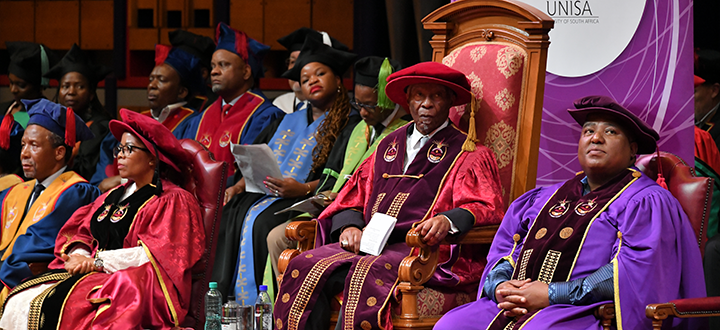 Click here to view a recording of the ceremony.
Click here to view a recording of the ceremony.
A major highlight on Unisa’s annual calendar, the Official Opening Ceremony presents a unique opportunity for the university to rededicate, renew and reaffirm its commitment to continuous improvement in the ever-evolving higher education landscape. This year, it was also to be a moment of appreciation for and farewell to the outgoing Chair of Council, James Maboa.
The ceremony coincided with the culmination of Unisa's 150th anniversary celebrations and the momentous occasion of the 30th anniversary of our country’s democracy.
Greener pastures lying ahead
In her opening address, Unisa Principal and Vice-Chancellor (VC), Professor Puleng LenkaBula, stated that the academic opening serves as a reminder that Unisa is dedicated to the continuation of its core business in pursuit of being the African university shaping futures in the service of humanity, and attentive to the ecological and climatic challenges that bedevil the world today.
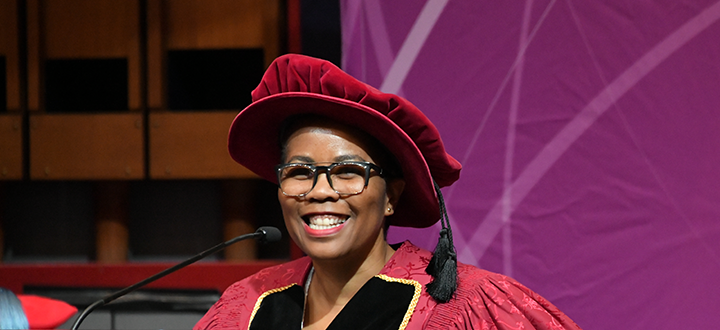
Unisa Principal and Vice-Chancellor, Prof Puleng LenkaBula
The VC lauded the late Nelson Mandela for being the first post-apartheid president of the country, who ushered in the dawn of democracy. She stated: “30 years ago, the late President Mandela, an esteemed alumnus of Unisa, ushered in the new South Africa as the first democratically elected president of the country, and for that we are eternally grateful.”
The VC stated that 20 years ago, Unisa and Technikon South Africa merged to create a dedicated, comprehensive, open distance and e-learning university. She continued: “We celebrate this merger in our hearts”. The VC said that the university now serves as the leading platform for public deliberations in the country.
Reflecting on Unisa’s duty as a societal citizen, the VC said: “I want us to never be attentive to only our challenges as an institution. We will fail dismally. We should ask the question: how are we going to rally together to ensure that the benefits and dividends of the 30 years of democracy and freedom are manifest for all, and that education, research, engaged scholarship and academic citizenship become important?”
She continued: “We must consolidate the societal engagements and create dialogical and research arenas that have global impact. Whereas we acknowledge that some of the fault lines of our societies in the aftermath of democracy require our attention as a university, we should be proud that since the democratic dispensation, we have established a constitutional democracy, a reformed public service, the right to vote for the government of one’s choice, the recognition of women’s rights, equal access for people living with disabilities, and basic services such as health care and education. We should be excited that our scholarship impacts this change.”
In conclusion, the VC dedicated a passage from Keorapetse Kgositsile’s poem, No Boundaries, in which she motivated the audience to keep moving forward to a landscape where dreams cannot be turned into nightmares.
A resilient university
Maboa reflected on departing from his position as Council Chairperson. He summed up his tenure at the helm as momentous and worth celebrating.
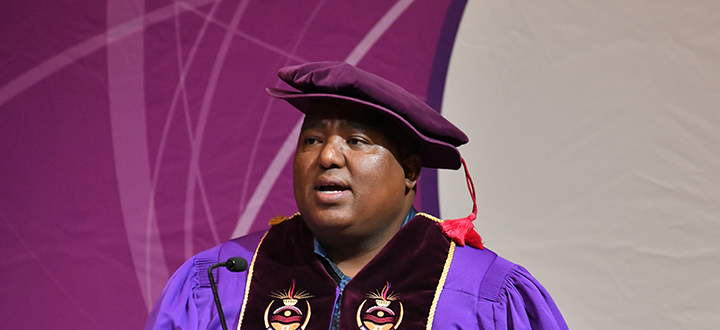
Outgoing Chair of Council, James Maboa
Maboa stated that during his tenure, the university witnessed fruitful events, which included Unisa’s rise in global university rankings, and a plethora of accolades won by academics such as the South African Women in Science Awards, the National Research Foundation-South African Agency for Science and Technology Advancement’s (NRF-SAASTA) FameLab Competition, and the Emerald Literati Awards.
Maboa congratulated the university’s management for the first-of-its-kind multi-year wage agreement signed between the university and its recognised labour unions. These achievements, he stated, are the result of collective hard work, dedication, and commitment to the university.
Maboa recounted that such achievements were earned against the backdrop of many challenges faced by the university, in addition to being cast in a negative light by the media. “Our collective resilience against these attacks has, however, enabled us to weather the storms,” he asserted.
Maboa extended his sincerest thanks to his Deputy and Chairperson-Elect, Dr Dan Mosia, the entire Council, past and present, and the extended management, for their support during his tenure. “I am leaving behind an army of committed and loyal servants of the university of the land, in whose hands the future of this university is safe,” he concluded.
30 years of transformation
“The academic opening not only occurs at the height of the university’s 150th anniversary celebrations, but also when the country is celebrating 30 years of freedom and democracy” said Mosia, in his maiden speech as Council Chairperson. He said that the celebration of the national milestone reflects the strides made in the last three decades of democratic rule, during which, he said, the country has been transformed significantly in the areas of health, education, business participation, infrastructure expansion, employment equity, and both rural and urban development, among others.
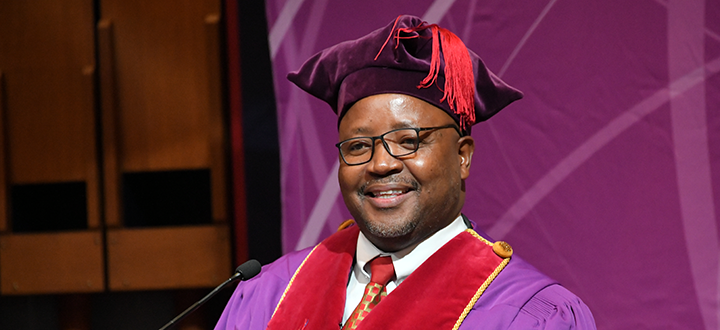
Chair-Elect of Council, Dr Dan Mosia
“The country is no longer the same since the advent of democratic rule in 1994,” said Mosia. He stated that the higher education sphere and the expansion of the requisite education infrastructure, increasing access to those who previously did not enjoy the right to quality education, and the expansion of the state’s financial support through measures such as the National Student Financial Aid Scheme (NSFAS), are some of the tangible gains of democracy.
In conclusion, Mosia thanked Maboa for his service and insights. He stated: “In all your ways, you have left an indelible mark.”
The thinking African
In his closing address, Unisa Chancellor and Former South African President, His Excellency Dr Thabo Mbeki, shared his message of condolences to the citizens of Namibia on the passing of their President, His Excellency Dr Hage Gottfried Geingob, who succumbed to cancer on 4 February.
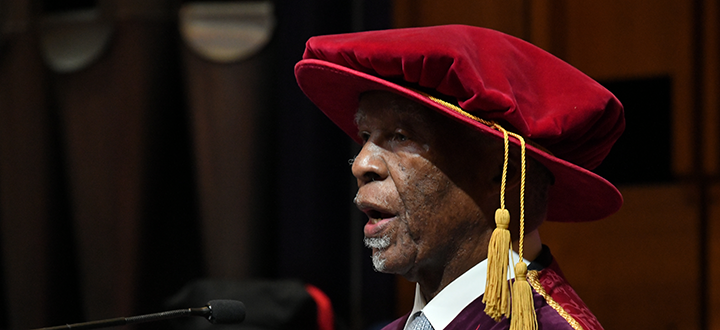
Unisa Chancellor and former President of South Africa, His Excellency Dr Thabo Mbeki
Mbeki expressed dismay while recollecting some of the passages of the book Can Asians Think? by Kishore Mahbubani, which, he said, suggest that Africans cannot think. He continued: “I would like Maboa to write a book titled Can Africans Think?. We need answers to this question. and this university is well placed to answer that question practically, by the quality of our students, research, and new knowledge, and through being the centre of excellence.”
In conclusion, the Chancellor said: “As we formally commence with the 2024 academic year, I wish the best to both staff and students. We must try to make sure that this year proves a point; that the African can think, and to shame all of those who thought they have the power and the right to put the university under administration.”
* By Godfrey Madibane, Acting Journalist, Department of Institutional Advancement
** Photography by Shooheima Chamption, Unisa Multimedia Centre
Views from the floor
Remembrance Manganyi, Kgothatso Mojela, Kagiso Moroatsehla , Nomusa Ngema and Seyabonga Thipe, journalism interns at the Department of Institutional Advancement, spoke to a number of Unisans attending the ceremony. Here is what they shared:
Sibusiso Sindiso Nhabathi, Bachelor of Arts in Communication Science
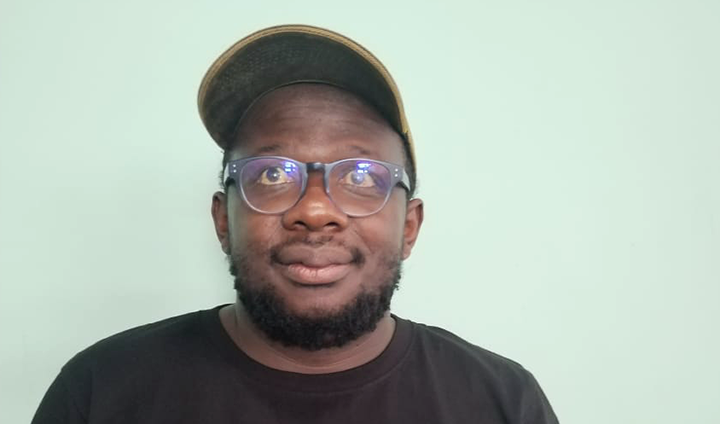
As a person that lives with a disability, universal access is one of the biggest contributors that draws me towards this institution. Unisa is an advocate for universal access. Unisa was the first institution that was able to give someone who lives anywhere, even in the most rural part of Secunda, access to study towards a degree.
The institution has moved from open distance learning to open distance eLearning, and that has encouraged learning through technology. This approach of the university having online programmes paired with content for the advancement of education will benefit South Africa economically, socially and politically. We are a country that needs all these things to come together.
To me, the highlight of 2023 was the College of Human Sciences’ programme of engagement. The dean has taken that college to a new level and what they’re doing has been beneficial for students.
Zanele Tshabalala, Venue Coordinator, Facilities Management Department
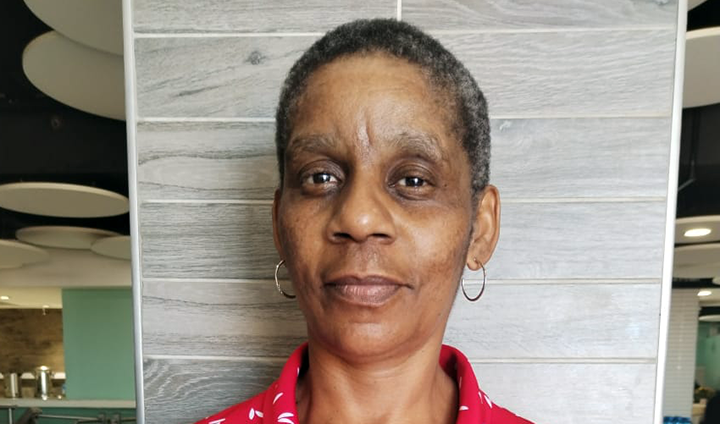
Our role is to ensure that Unisa’s venues are clean and up to date. Our requirement is to meet our clients’ needs and without us there is no Unisa. I work in the most reliable department in Unisa because it takes care of each and every individual, internally and externally. I am very proud to be a Unisa staff member.
The highlight of 2023 to me was preparing for the birthday of the university. We made sure that all the plans were up to date, and we met every requirement.
In 2024 I would like to see Unisa permanently employ all staff members. I am happy with the changes made at the university last year, which have resulted in improvements.
Mapula Mkhabela, Lecturer, Department of Criminal and Procedural Law
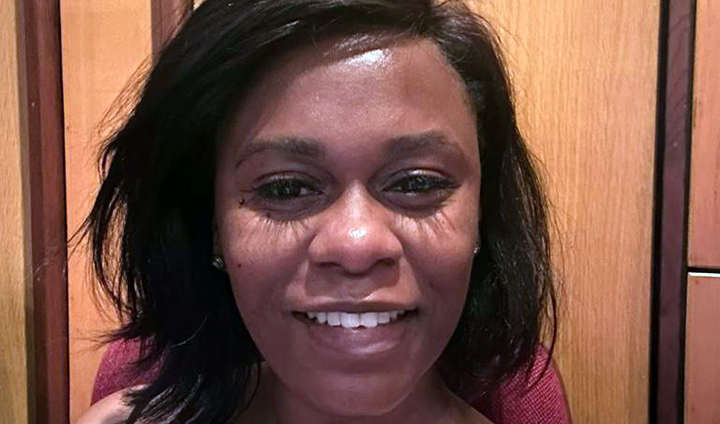
Unisa has been a valuable resource for society for 150 years. Its dedication to excellence in education and innovation has helped students grow intellectually. The university continues to strive for transformation and embrace cultural diversity and the needs of students locally and globally.
The university's accomplishments and effective leadership in promoting academic excellence have significantly improved my understanding of what it takes to become an engaged and thoughtful scholar. I am aware of the difficulties faced by students, particularly in accessing information due to the challenges of digitalisation and limited resources.
To expand student support, resources for inclusivity are critical, including financial support.
Lerato Sithole, Administrative Assistant, Department of Mercantile Law
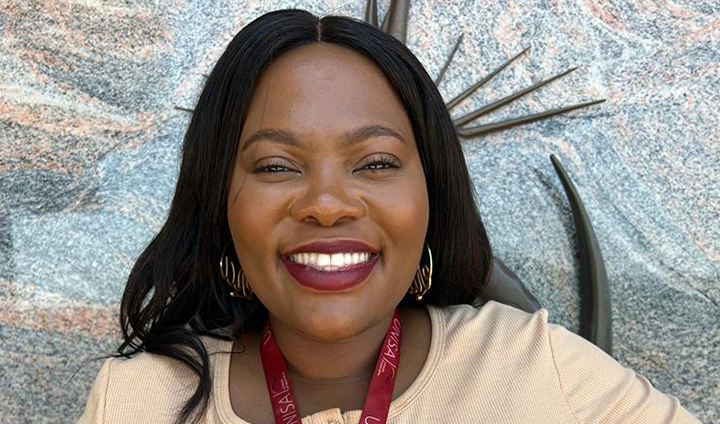
I believe that the university has had a positive impact on both individuals and society as a whole, by providing students from both advantaged and disadvantaged backgrounds with the opportunity to further their studies. This opportunity is not restricted to those who attend classes but also extends to those who are working and those who are not.
In addition to being a staff member I am also an alumna of Unisa, and I did not face challenges during my studies at the university. A highlight for me in 2023 was graduating, and receiving a certificate with a 150-year logo.
I hope to see Unisa expand further by 2024, to the point where it can provide financial assistance to more students from underprivileged families who are unable to afford their registration fees. Once Unisa's financial capacity grows, they may be able to cover the students' fees with bursaries.
Nkosinathi Mabilane, President, Unisa National Student Representative Council (NSRC)
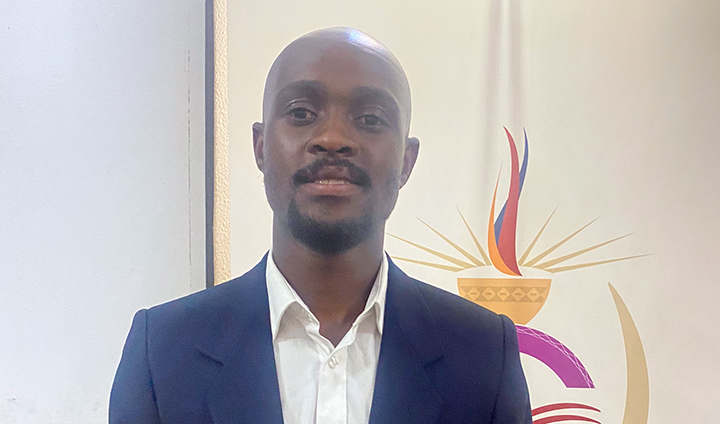
From the start of our term in office as NSRC members, the university was faced with the challenge of being put under administration by Minister of Higher Education. We had to deal with those challenges and the factors around these challenges which came at a critical time where most of our students were writing exams. We are extremely thrilled to be opening the university when it looked like it would not be happening this year. This year our country celebrates 30 years of democracy and the university celebrates 150 years since it was established, so we are optimistic that this year we will achieve more, we will excel.
Unisa has steadily climbed in the world university rankings, so we're extremely excited about this year and we hope to end the year at least in the top five positions on the rankings.
The university boasts remarkable alumni, including a number of leaders in, among others, the business, political and judicial arenas. In its 150 years of existence the university has produced many black people who have risen to prominent positions, and we are therefore a beacon of hope to the black child.
In 2024 we are hoping for better service delivery to students, and support from the university in dealing with National Student Financial Aid Scheme (NSFAS) issues. We would like to see an improved ICT infrastructure and we'd like our students to experience zero challenges when it comes to writing examinations.
Neo Mlangeni, Bachelor of Arts in Visual Multimedia Arts
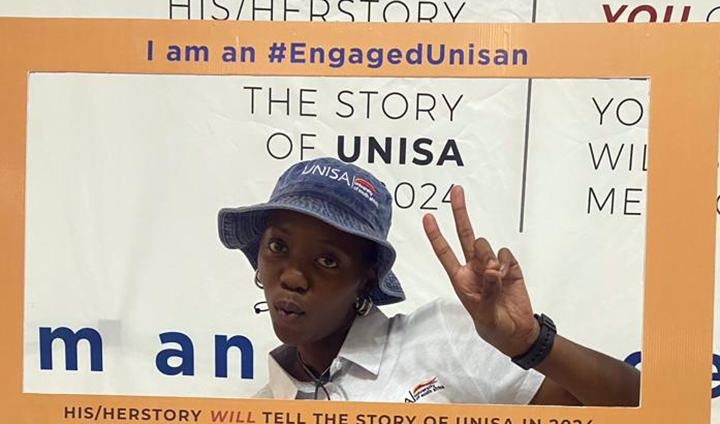
Unisa’s impact has been to upscale and upskill me in terms of the digital side of things. The university has shaped us in engaging with each other on different platforms. Unisa is reclaiming our futures by allowing us to express ourselves. I'm not the same person I was in 2017.
The main challenge I've experienced as a student was balancing work and studies. Other than that, it was a learning curve, and I have come to realise that anything is possible if you put your mind to it. You just have to show up.
I'd love students to engage more and build communities, let go of individualism, and collaborate. By collaboration I mean that you don't have to do everything alone. If somebody's good at something, ask them to show you how to do things. Communication and community are key. We need to spread more love.
Ryan Newman, HR Development Practitioner, Human Resources Department
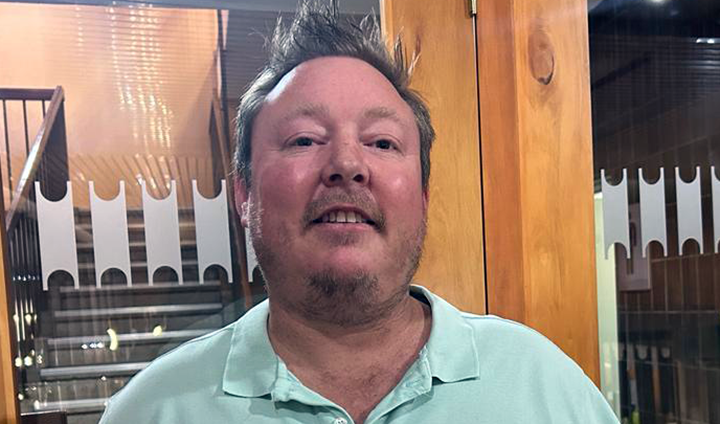
As staff members we can learn just about for free. In this way, I've been able to obtain different qualifications, which has helped me move up within the institution. I've bettered my life by being at Unisa.
I think one of the greatest highlights in 2023 was the 150th anniversary. It's an huge milestone for any institution to achieve, let alone an institution of higher education.
2024 is a year in which a national election will take place, and I think this year should be a year of change and new hope. I'm expecting that the university brings that kind of hope to the institution, but also to the country because this country needs a change for the better. I think we're headed in the right direction.
Denzil Chetty, Lecturer, Academic Development Open Virtual Hub
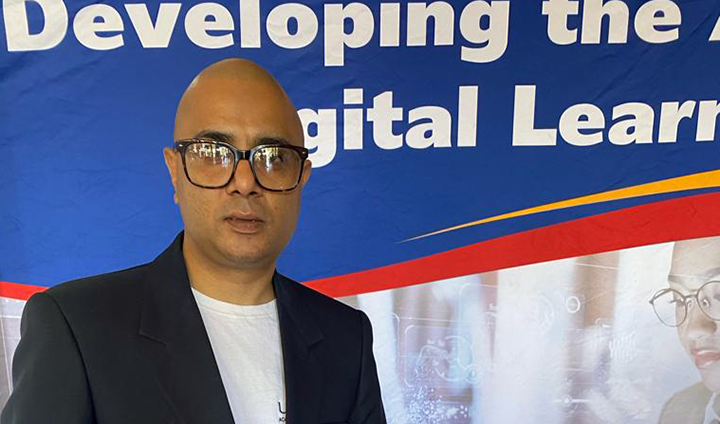
The university has brought in more technology and innovation, specifically in teaching and learning. We get a lot of students coming into the university with a lack of exposure to technology. What our unit has done is to bridge that gap with digital skills, exposure to technology and specifically innovation such as with robotics and artificial intelligence.
A 2023 highlight was the fact that we could purchase Unisa’s first semi-humanoid robot. We also had this robot facilitate an online session for students on academic integrity. Students felt that this was really something new for them, something innovative, and very positive responses were received from the students. I think this was a groundbreaking opportunity for Unisa to advance in this area. I think the biggest priority for us is that our students face challenges with accessing technology and data connectivity. As an institution, we must start thinking of how we manage innovation while managing some of these challenges as well.
One of our objectives for 2024 is to focus on skills development for female students.
Lynette Van Niekerk, Events Coordinator, Department of Institutional Advancement
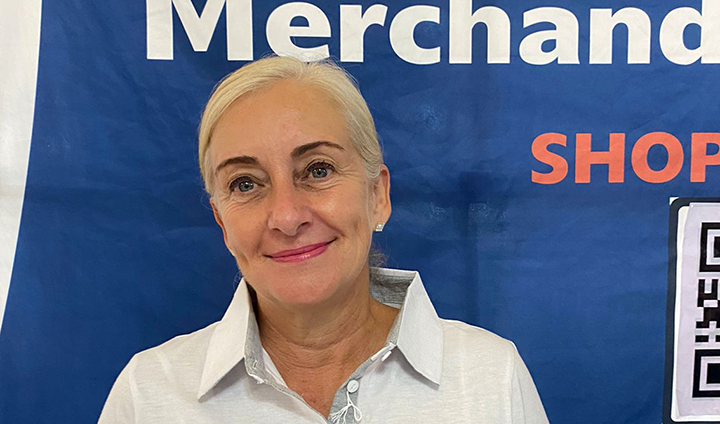
Unisa has given students the opportunity to study whilst working, so I think that is a great thing. Our online university enables students to work and study from a distance, and that is one impactful way that we've made a difference in the lives of students. At the Unisa Foundation, we raise funds for student bursaries. We also trying to help those students who cannot finish their studies to complete their studies through Unisa.
For me, the greatest highlight last year was the Chancellor's Calabash Awards Dinner which we host once a year, at which Dr Mbeki presents awards to outstanding South Africans who have impacted society. This offers Unisa the opportunity to thank such individuals for making a difference.
This year, I think we must continue to strive being the best university by reclaiming Africa's intellectual future. I would like to see our world ranking to move to number one. In terms of the Calabash Awards, I would like to see that we honour a female struggle icon for bringing about a new, improved South Africa.
Publish date: 2024-02-16 00:00:00.0

